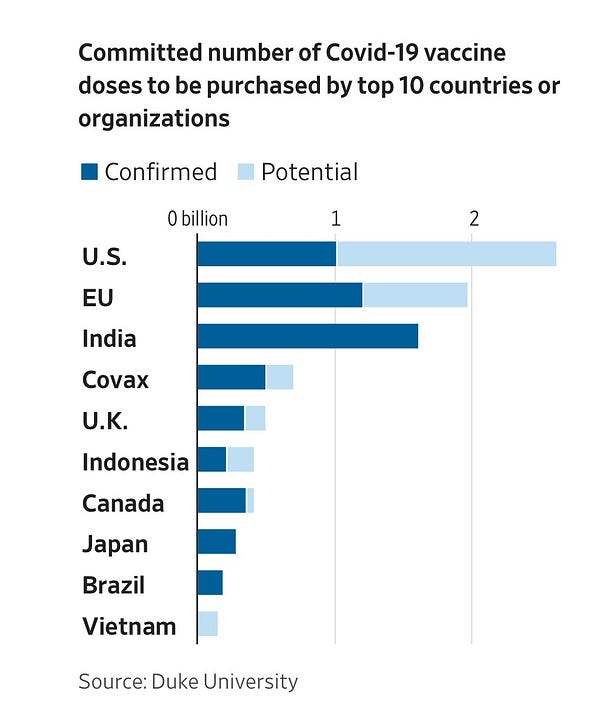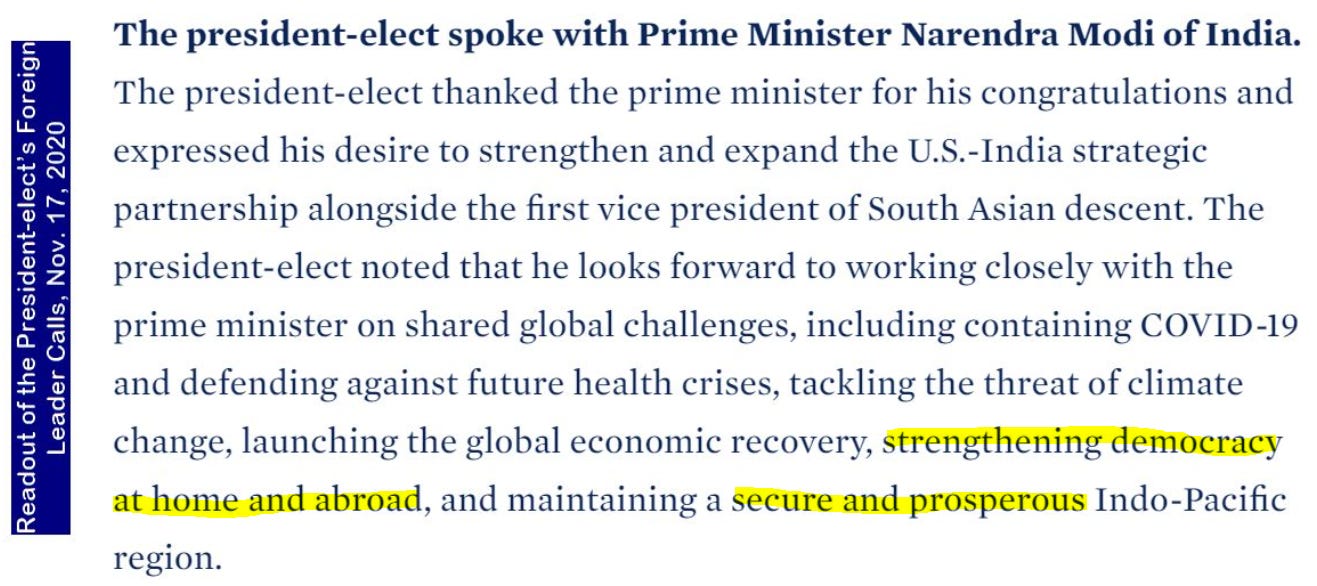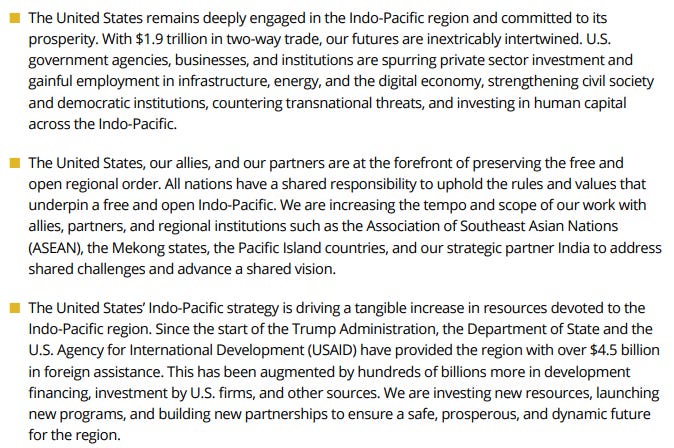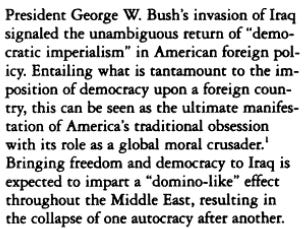Insightful newsletter of Drishtikone: Issue #184 - Biden = End of US Power = Chinese Global Supremacy
Biden's seemingly innocuous messages to the Asian leaders in particular are nothing short of capitulation of US power.
Photo by Paweł Czerwiński on Unsplash
“All you have to do is write one true sentence. Write the truest sentence that you know.” ― Ernest Hemingway
The diplomatic lingo is so carefully crafted that you convey a lot without saying much. Just a different set of words can signal a complete overturning of the global world order. Trump was not versed in diplomatese and that is why his outbursts were so inelegant yet harmless. Biden with just a phone call each to the world leaders has signaled the way of things to come. And, it will not be pretty for the world.
More importantly, his ascendancy and those who write his scripts will ensure that America’s time is over.
It is time to welcome the new superpower. The ‘coup’ has been successful.
What Biden means to Asia and India?
Indian PM Narendra Modi and US President-elect Joe Biden had a call on November 17. This is the brief of what transpired in the conversation. Please focus on the highlighted part.
On the face of it, this may look harmless or innocuous, but in diplomatic terms, it suggests a complete U-TURN in American engagement strategy with the Asian allies.
Free and Open Indo-Pacific to Secure and Prosperous Indo-Pacific U-turn
Donald Trump's administration had charted a new course with respect to the concern about China amongst all the Asian allies. The central precept of that strategy was the “Free and Open Indo-Pacific” (FOIP) vision.
These were the main components of that vision and rules of engagement as described in the November 2019 statement (Source)
This concept was not just a concept that was important to one country. It was first shared by Japan in 2016 and adopted by US in 2019.
Japan introduced the FOIP concept and formally put it down as a strategy in 2016. In 2019 the United States Department of State published a document formalizing its concept of a free and open Indo–Pacific. (Source)
At the center of this strategic vision in Asia was the ‘containment of China’ and managing a competitive situation emerging out of China’s aggression.
Despite this caution, veiled references to Japan’s concerns about China’s aggressive behavior suggest FOIP arguably contains elements of an effort to manage the regional strategic competition. The Abe administration recently released a new defense strategy that prioritizes advanced capabilities and places security cooperation with the United States and other countries under the FOIP framework. (Source)
So this week when the Australian Prime Minister is engaged in meetings with the Japanese leadership, he also interacted with the ex-Japanese PM Shinzo Abe. Abe was the architect of the “Free and Open Indo-Pacific” concept.
In that meeting, Scott Morrison and Shinzo Abe discussed the importance of the FOIP vision and the Quadrilateral Security Dialogue, or QUAD, between the U.S., Japan, India, and Australia.
However, in Joe Biden’s new world view, the “Free and Open Indo-Pacific” has now been replaced by a “Secure and Prosperous Indo-Pacific.”
A readout by the president-elect's transition team on the calls with Morrison and Suga says that Biden talked about maintaining a "secure and prosperous Indo-Pacific," avoiding the "free and open" phrase. The subtle differences with the Trump administration has other Quad members worried about a potential position shift by the Biden administration. (Source)
This is a very serious change in US diplomatic direction! And it also signals a major misalignment with the larger understanding that the Asian powers have with respect to the challenges from China.
But the momentum toward deeper collaboration could slow if Biden's foreign policy downgrades India's importance in regional strategy and returns -- as Biden has signaled -- to the Obama-era approach of cooperating with China in areas where Sino-U.S. interests converge. This would mark a break with the current approach that sees the U.S. in deeply ideological -- even existential -- conflict with the Chinese Communist Party. (Source)
To understand how fundamentally different Biden’s evaluation of China - and horribly flawed - is, you need to remember this infamous stumbling, stuttering underplaying performance by him in a campaign rally in 2019.
Wow. Let us read what he said - slowly.
“China is going to eat our lunch? Come on, man,” the former vice president said. “I mean, you know, they’re not bad folks, folks. But guess what? They’re not competition for us,” he added. (Source)
Either Biden has been sleeping under a rock for the last decade. Or the Chinese have him by his you-know-what.
One may say that China is not going to be an 'immediate’ threat to US and its interests, but to say that they are “not a competition” is a sign of blind mad-ness!
"He’s absolutely incorrect," Chang declared, adding "you know, one can argue that China doesn’t pose for instance a robust challenge to the US, we can argue that we will prevail. But to say as the vice president said that they’re no competition to the US is just inexplicable." (Source)
What does this mean for the US? That it’s the end of American power and the beginning of supremacy of the Chinese Communist Party, which China’s establishment is anyway. And, Aarti Tikoo summarized this very well in her tweet.


Now the other part, which is as dangerous as the first flip-flop.
‘Strengthening democracy’ by the man who stole elections is a short-hand for interference
The fetish for “strengthening democracy at home and abroad” has many connotations. But the most important part of this is strengthening democracy abroad. Which is another way to describe the American obsession with Democracy promotion. Over the years, after its unveiling during the Cold War period, it has become an entire industry.
When the goal of fostering and strengthening democracy abroad became a significant element of U.S. foreign policy in the 1980s, an informal network of enthusiastic democracy practitioners, activists, and scholars emerged within the foreign policy community. Over time, their numbers expanded to encompass diplomats, aid practitioners, members of Congress, and others. (Source)
Of course, the war industry has been left out here.
Quite simply put, the American obsession with playing the global policeman has been an utter failure.
Unfortunately, a soon-to-be-published collection edited by Larry Diamond and Mark Plattner suggests that these (and other) efforts at democracy promotion have not fared well. Success stories like the recent end to military rule in Myanmar are balanced by the more numerous and visible failures in Libya, Yemen, and Iraq, the obvious backsliding in Turkey, Hungary, Russia, Poland, and elsewhere, and the democratic dysfunctions in the European Union and in the United States itself. As Diamond points out in his own contribution to the book, nearly a quarter of the world’s democracies have eroded or relapsed in the past 30 years. (Source)
And, the US has been spending USD 2 billion annually on this failed policy objective (Source).
You see the problem is that (1) pushing the US version of democracy (which in itself is highly flawed!) down the throat of another society has failed consistently, and (2) it has created even bigger problems (Saddam Hussein to ISIS transition). It is, as Omar G. Encarnación calls it “Democratic Imperialism.” (Source)
Coming from a Democrat President, of a party which has shamelessly intervened in the laws passed by the parliament of a larger, better, and more robust democracy than the US, by passing anti-CAA resolutions in different cities underscores the intent of the ostensibly innocuous-looking phrase in Biden’s call with Modi.
Biden was signaling a significant ratcheting up of interference in India’s internal governance by the Biden administration!
If the Indian administration team was smart enough, it would create various think-tanks and start creating ‘atrocity literature’ on how Joe Biden stole elections and the illegitimacy of his own democratic standing! But that assumes a smart Modi administration in terms of communication strategy on a global stage, which has been, well, an oxymoron!
the rush for COVID vaccine and strategies for supplies
There is a big rush and fight for the COVID vaccine. Very few countries have had the foresight to be ready for the vaccine well in advance. The first in the line are obviously the developed nations, while the poor ones lag behind.
Except for India.
India’s government followed a different strategy of becoming the production base for all these drugs on a mass scale. This meant that India had a say and a right to the supply of the vaccines as well. So, if you check the confirmed commitments, India is #1 on the list. Of course, it needs much more. Why? Because every person will need two doses of the vaccine. So, India needs over 2.5 billion doses.


Pakistan, on the other hand, is running around with a begging bowl even for the vaccine.
It seems now the Washington administration has given a nice kick on its back-side and thrown it out of the queue.
Pakistan’s embassy in Washington informed the Ministry of Foreign Affairs (MoFA) that they had contacted Johnson & Johnson to make advance booking of its COVID-19 vaccine. “Johnson & Johnson has not responded to our request for COVID-19 vaccination supply,” said a letter by MoFA sent to the Ministry of National Health. “The US authorities have however, informed that this company would first meet the domestic needs of USA before being allowed for commercial release.” The Correspondent has copy of this communication. (Source)
So, the Pakistanis are now forced to bank upon the Chinese vaccine, which is being tested on Pakistani civilians anyway using them as guinea pigs.
market corner - 10 quick bytes
The depositors of Lakshmi Vilas Bank have withdrawn approximately Rs 10 crores in ONE day - more / DBS Bank India Ltd (DBIL), the Indian arm of Singapore lender (govt backed) to save LVB - more / All India Bank Officers’ Confederation (AIBOC) opposes the DBS-LVB merger - more

Niti Aayog proposes setting up an oversight body for AI - more
Pivotal role Atmanirbhar Bharat initiative, the Government e-Marketplace (GeM) in MSME growth. Order volumes grew 88% in one year - more
Taiwan-based fabless semiconductor company MediaTek has acquired Intel Enpirion power management chip product line-related assets for $85 million - more
SEC rules for delisting of companies for not complying with US auditing rules could kick Chinese companies off US stock exchanges - more
The Income Tax department has issued refunds worth over Rs 1.36 lakh crore to over 40 lakh taxpayers so far this fiscal - more
Indian real estate major DLF has been included in the Sustainability Indices (DJSI) in the emerging markets category - more
Analysts bullish on mid-and small-caps; expect outperformance in 2021 - more
OnePlus' Android OS-based OxygenOS (74%) most preferred among Indians, followed by Apple iOS (72%): Study - more
Monthly active users for Flipkart, PhonePe at 'all-time high - more
nota bene
State-of-the-art habitat facilities in Ladakh: The Indian Army has completed the establishment of habitat facilities for all troops deployed in eastern Ladakh to ensure operational efficiency in the harsh winter months. “In order to ensure operational efficiency of troops deployed in winters, the Indian Army has completed the establishment of habitat facilities for all troops deployed in the sector,” said a source. Nearly 50,000 troops of the Indian Army are currently deployed in a high state of combat readiness in various mountainous locations in eastern Ladakh in sub-zero conditions as multiple rounds of talks between India and China have not yielded any concrete outcome to resolve the military standoff that erupted in early May. China has also deployed an equal number of troops, according to officials. (Source)
BJP ready for Mamata in Bengal: The Bharatiya Janata Party (BJP) has expanded its presence to over 83 percent of polling booths in West Bengal and is relentlessly working on the ground to defeat the Mamata Banerjee-led the All India Trinamool Congress(TMC)in the upcoming assembly polls, with Amit Shah and J P Nadda galvanizing the rank and file with their regular visits, party state president Dilip Ghosh (Source)
Christian agenda against COVID vaccine: Sundar Selvaraj, a Christian tele-evangelist who owns ‘Angel TV’, aired a show in August this year where he claims that the Coronavirus vaccine has an in-built chip. Instigating people against the vaccination drive, Selvaraj asked people to ‘run away from the vaccine’ as it has the ‘mark of the beast’. (Source)
Rise of obesity by 2020: More than four billion people could be overweight by 2050, with 1.5 billion of them obese, if the current global dietary trend towards processed foods continues, a first-of-its-kind study has predicted. Warning of a health and environmental crisis of "mind-blowing magnitude", experts from the Potsdam Institute for Climate Impact Research (PIK) said that global food demand would leap 50 percent by mid-century, pushing past Earth's capacity to sustain nature. Food production already hoovers up three-quarters of the world's freshwater and one-third of its land -- and accounts for up to a third of greenhouse gas emissions. (Source)
Surveillance aircraft buy for Indian forces: The Indian Navy today received its ninth P8-I long-range maritime reconnaissance and anti-submarine warfare aircraft from Boeing. The aircraft, first of the second batch of four P8-I bought by India, arrived in Goa from Seattle in the US after stops at Hawaii, Guam, and Brunei. Eight of these aircraft, which were ordered in the first batch, have already been delivered and are in service with the Indian Navy. (Source)
Tibetans to decide Dalai Lama: The US backs the right of the Tibetan Buddhists to select the next Dalai Lama and the Chinese Communist Party does not have the authority, according to a US official dealing with international religious matters. "The United States is opposed to China picking the next Dalai Lama," Samuel Brownback, the ambassador-at-large for international religious freedom said on Tuesday. (Source)

how is Artificial Intelligence changing our society?
Artificial Intelligence is the next frontier for humankind. What does it mean? How will it change things for us? Here is a video that helps explain all that!
This documentary journeys to the hot spots of AI research in Europe, the USA and China, and looks at the revolutionary developments which are currently taking place. The rapid growth of AI offers many opportunities, but also many dangers. AI can be used to create sound and video recordings which will make it more and more difficult to distinguish between fact and fiction. It will make the world of work more efficient and many professions superfluous. Algorithms can decide whether to grant loans, who is an insurance risk, and how good employees are. But there is a huge problem: humans can no longer comprehend how algorithms arrive at their decisions. And another big problem is AI’s capacity for widespread surveillance. The Chinese city of Rongcheng is already using an AI-supported 'social credit system' to monitor and assess its citizens.
Educative and informative!
Today’s ONLINE PAPER
Check out today’s “The Drishtikone Daily” edition.
Support Drishtikone
If you consider our work important and enriching and would like to contribute to our expenses, please click on the button below to go to the page to send in your contribution. You can select the currency (for example, INR or USD, etc) and the amount you would like to contribute.
If you like this post - please share it with someone who will appreciate the information shared in this edition -
If you like our newsletter, please share it with your friends and family -







